![]()
Monday, March 6, 2017 | Dr. Raz Zimmt
Originally published by the Meir Amit Intelligence and Terrorism Information Center.
Overview
Donald Trump’s inauguration as president triggered a change in the attitude of the US administration toward Iran and increased the tension between the new administration and Tehran within a short while. The change was reflected both by the escalation of anti-Iranian rhetoric on the part of American senior officials, and first and foremost by President Donald Trump, as well as by an expansion to a certain extent of the economic sanctions against Iran. Even though both sides have so far refrained from undesired escalation, the change in the stance of the US administration strengthened the Iranian concern about the intentions of the new president.
In their public reactions to the declarations by senior officials of the US administration, Iranian senior officials usually tried to belittle the significance of the threats on the part of Washington. They warned the United States not to threaten Iran; They claimed that those were idle threats and that the United States could do nothing against Iran; They stressed that the US threats would not influence Iran and not change its policy, including in relation to the missile program and Iran’s regional policy. Senior Iranian military officials, on the other hand, adopted more vehement rhetoric against the US, emphasizing Iran’s military power and threatening the new administration not to dare act against Iran.
However, despite the Iranian public attempts to belittle the significance of the change of the US administration, the ITIC believes that an authentic Iranian concern about the policy of the Trump administration is evident. Indeed, since President Trump entered office, Tehran became even more convinced that he would not cancel the nuclear agreement, especially in view of the opposition to such a step on behalf of the other powers which are signatories to the agreement. On the other hand, there is increased concern in Iran that more pressure would be exerted by the American administration on Iran, which would deter European companies from entering Iranian markets and foil Iran’s intention to bring about an economic improvement following the nuclear agreement. In addition, it is evident that the Iranians are concerned about the formation of an anti-Iranian regional coalition and an American reaction to Iranian provocations against the US and the international community.
In an initial attempt to respond to anti-Iranian steps by the US, Iran evidently increases its diplomatic activity in the regional and international arenas. President Rouhani’s recent visit to Oman and Kuwait may indicate Iran’s increasing conviction that that it needs to alleviate the tension in the region and improve its relations with its Arab neighbors in the Persian Gulf. At the same time, Iran is acting in the international arena to ensure that the other countries that signed the nuclear agreement remain committed to it. Iran also strives to enhance its economic ties with Russia, the Euro-Asian Union, and other countries.

Arab countries and Israel encourage President Trump to go to war against Iran (Fars News, February 5, 2017).
In the domestic Iranian scene, President Hassan Rouhani’s political opponents on the conservative right take advantage of the tension with the Trump administration to exacerbate their criticism against the president. As part of their attempts to express their disapproval of the president prior to the upcoming elections for the Iranian presidency, which are due to take place in May 2017, his opponents claim that his policy of appeasement and his trust in the US administration have led to the escalation in the US stance toward Tehran. However, even the radical opponents refrain for the time being from calling for a deliberate violation of the nuclear agreement on the part of Iran. It is evident that even President Rouhani’s harsh critics prefer that the responsibility for the possible collapse of the agreement, which wasn’t to their liking in the first place, be borne by the US administration rather than Iran.
In the ITIC’s assessment, in spite of the mounting pressure on the part of the US, Iran is not expected to change significantly the essential elements of its policy, mainly with reference to its missile program, its desire to achieve regional hegemony, and its support of terrorism, which, from the perspective of the Iranian regime, serve its vital national interests.In the ITIC’s assessment, at most, Iran would be willing to tone down publicly and partially its provocative behavior toward the US and the international community. This includes detention of Western nationals of dual citizenship, operating against US vessels in the Persian Gulf, etc.[1] This is due to the fear of a retaliatory action by the US or mounting American pressure, which may have an adverse influence on Western countries’ willingness to expand their economic ties with Iran.
In conclusion, the ITIC believes that Iran will continue in its policy of testing the limits, while trying not to create situations that would get out of control, such as a blatant violation of the nuclear agreement. Iran will refrain as much as possible from providing the new administration with a pretext to engage in an aggressive action against it and to mobilize the support of the international community for that purpose. At the same time, Iran will continue its diplomatic efforts to strengthen its relations in the international arena (with an emphasis on European countries, Russia and East Asia), and alleviate as much as possible the regional tension, in order to make it difficult for the United States to mobilize international and regional support for an anti-Iranian coalition.
The tension between Iran and the US after the inauguration of Donald Trump as president
Donald Trump’s inauguration as president on January 20, 2017, created within a short while a significant change in the stance of the US administration toward Iran and escalated the tension between the new administration and Tehran. The test launch of a ballistic missile carried out by Iran in late January 2017 triggered a wave of vehement statements by senior US administration officials, and first and foremost by President Trump, against Iran: Following the test launch, General Michael Flynn, the president’s former national security adviser, declared that Iran “was on notice.” The president himself sent a warning to Iran, accusing it of “playing with fire,” as he put it, and made clear that he didn’t rule out a military action against it. In an interview with Fox News (February 6, 2017), Trump called Iran the world’s No. 1 terrorist state. He reiterated his previous criticism of the nuclear agreement, which he had described as the “worst agreement he had ever seen.” Trump’s Vice President Mike Pence declared in an interview with ABC News (February 5, 2017) that Iran would act properly if it didn’t test the new president’s resoluteness, and said that it must consider carefully its belligerent and provocative actions.

President Donald Trump and the Israeli prime minister hiding behind him marked Iran as a target (Fars News, February 15, 2017).
The US administration did not settle with declarations. Following the test launch of the ballistic missile, the US treasury announced on February 3, 2017, the imposing of economic sanctions against thirteen senior officials (eight of whom were Iranians) and a dozen Iranian or Iran-affiliated companies.
Even though both parties have so far refrained from escalating measures, the American conduct increased the concern in Tehran of the new president’s intentions. Statements made by Iranian officials expressed the concern that the new American president would carry out the threats he had made during the election campaign to cancel the nuclear agreement and exacerbate sanctions on Iran on various pretexts, such as the continuation of the long-range missile program, Iran’s regional policy, and the violation of human rights.[2] This concern grew stronger after it had turned out that the new administration was adamant to change the attitude taken by the Obama administration and embrace a more aggressive line toward Tehran.
The Iranian reaction to the threats of the Trump administration: belittling the significance of the American threats
In their public reactions to the statements by the US administration senior officials, senior Iranian officials tried to belittle the importance and significance of the threats by Washington. They warned the United States not to threaten Iran; They claimed that these were idle threats and that the US could not do anything against Iran; and stressed that the American threats would not influence Iran and would not bring about a change in its policy, including in relation to the missile program and Iran’s regional policy.
In his first reaction to the threats by the United States, Supreme Leader Khamenei declared that he thanked Trump for exposing the United States’ true face to the world. In a speech he delivered to Iranian Air Force officers on the eve of the Islamic Revolution Day, Khamenei referred to Trump’s statement that Iran should thank the Obama administration for its conciliatory policy toward it. Khamenei said that Iran had no reason to thank an administration that imposed sanctions on Iran, created ISIS, set fire to Iraq and Syria, and assisted the riots against the Iranian regime in the summer of 2009. Khamenei reiterated his own stance that the “Great Satan” (i.e., the United States) should not be trusted and no hopes should be placed in those opposing the very existence of the Islamic regime in Iran (the Supreme Leader’s website, February 7, 2017). In another speech, Khamenei claimed that the US threats to take military action against Iran were intended to deflect Iranian senior officials’ attention from the true war waged by the US against Iran in the economic battlefield and the cultural arena (the Supreme Leader’s website, February 15, 2017).
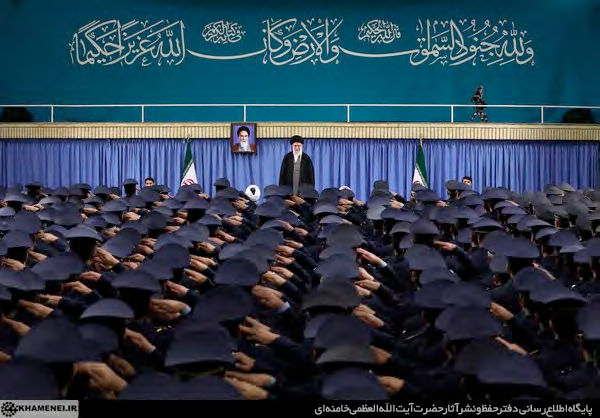
Khamenei delivering the speech to Iranian Air Force officers (Supreme Leader’s website, February 7, 2017).
Other Iranian senior officials also belittled the significance and the importance of the American threat:
- President Hassan Rouhani rejected the US threats. Talking to journalists on the anniversary of the Revolution, Rouhani declared that the massive presence of Iranian citizens in the Revolution Day rallies was intended to send a message to the US leaders that they should refrain from threats and intimidation against the Iranian people. Rouhani noted that during the 38 years that had passed since the Revolution, the Iranian people proved that anyone talking to them in the language of threats would have to regret that. He announced that the American threats would not succeed in deterring Iran from continuing to follow in the path of the Revolution (Fars News, February 10, 2017).
- Foreign Minister Mohammad Javad Zarif declared that the US threats against Iran do not affect it. According to Zarif in an interview with NBC, Iran is not frightened by the threats and the sanctions against it are ineffective. However, he pointed out that his country does not desire any confrontation with the US (IRNA, February 20, 2017).
- “Iranian senior officials”pointed out, in response to the US claims regarding the test launch of the surface-to-surface missiles carried out by Iran that the Iranian missile program is defensive in nature. According to them, these tests do not represent any violation of the UN Security Council resolutions because the missiles were not intended to carry nuclear warheads. Ali-Akbar Velayati, the Supreme Leader adviser for international affairs, declared that Iran would continue with its missile program, which is intended for defense purposes only. Following the statements by US National Security Adviser Flynn, who warned Iran after the test that it had carried out in late January 2017, Velayati said that it wasn’t the first time an unexperienced man from the US threatened Iran and that in time, also President Trump would understand that hollow, vain statements against Iran only damage his credibility (ISNA, February 2, 2017).
- Iranian senior officialsalso dismissed reports that the US administration intends to designate the Revolutionary Guards a terror sponsoring organization. Foreign Minister Zarif said that the United States has no interest in doing so since the whole world knows that the Revolutionary Guards provide the most support to the countries of the region in their struggle against terror (Mehr, February 25, 2017). In an interview with Al-Jazeera, Ali-Akbar Velayati said that Iran is not afraid of threats and that an American operation against the Revolutionary Guards would not influence their support of Hezbollah, Iraq and Syria (Fars News, February 9, 2017).
- Khamenei’s advisor Ali-Akbar Velayatialso tried to calm the situation and said that a military confrontation between Iran and the US is unlikely. In an interview with the Tasnim News Agency (February 12, 2017), Velayati referred to Trump as a “calculated man” and estimated that the American president would not initiate a confrontation with a powerful country such as Iran, which may end up in an unprecedented fiasco in American history. Velayati noted that the US is not as strong today as it was when it attacked Iraq and Afghanistan, and that Iran, in comparison, is stronger than these countries. Therefore, not only would Trump not dare attack Iran, but conditions in the United States do not allow him to act as he pleases.
Iranian media also tried to belittle the importance of the US threats. A series of editorials published in recent weeks in the Iranian media claimed that the threats by the new American administration are baseless. Iranian commentators estimated that President Trump is not interested in a military confrontation with Iran since this is contradictory to his wish to address his country’s domestic matters as his top priority. Commentators also pointed out the weighty constraints facing Trump, which have already forced him to back down from some of his intentions, for instance, regarding the transfer of the US embassy in Israel from Tel Aviv to Jerusalem. Thus, for instance, the conservative daily Javan (February 14, 2017) claimed that the new president is occupied with domestic challenges and therefore cannot execute a military option against Iran. The military threats by the US are part of a psychological war conducted by Western media in an attempt to instill fear of war in Iranian society, the newspaper said. The reformist daily Mardom Salari (February 25, 2017) also estimated that the American president is not expected to take any military action against Iran because he is occupied with other issues, including China and Russia, and that at any rate he does not have the required legitimacy in his own country to declare war against Iran.
Notwithstanding the relatively cautious tone of the statements of Supreme Leader Khamenei, senior political officials, and the Iranian media, senior Iranian military officials adopted a harsher rhetoric toward the US and warned the new administration not to dare act against Iran. Revolutionary Guards Commander Mohammad-Ali Ja’fari declared in a ceremony on the anniversary of the Islamic Revolution that the American administration must recognize the uselessness of threats against Iran while the enemies of the Islamic Revolution recognize its might. Ja’fari claimed that even American commentators are aware of the risks entailed in a confrontation with Iran and present to President Trump assessments that Iran is treating the US as a “paper tiger” (Tasnim News, February 8, 2017). Revolutionary Guards Deputy Commander Hossein Salami also warned the US against using a military option against Iran, saying that the enemy knows that opting for the military approach would turn its country into a “cemetery for the aggressors” (Fars, February 20, 2017).
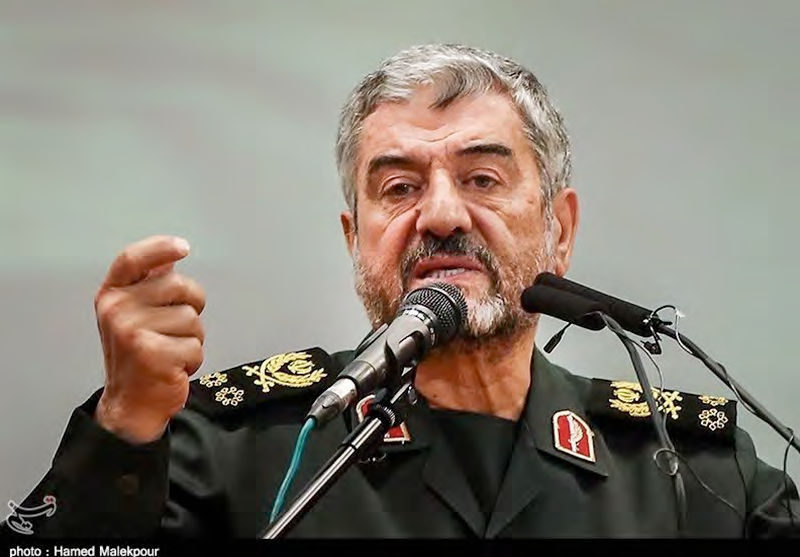
Revolutionary Guards Commander Mohammad-Ali Ja’fari: The enemies of the Islamic Revolution also recognize the military might of Iran (Tasnim News, February 8, 2017).
Public rhetoric vs. authentic Iranian concern
In spite of the public rhetoric, which usually tried to belittle the risks posed to Iran by the new American administration, the ITIC believes that as a matter of fact, the Iranian regime does not completely rule out these possible risks. The main such risks from the Iranian perspective:
- Concern about economic damage: The main Iranian concerns are centered in the creation of a negative international atmosphere that would have a negative effect on Western companies’ willingness to once again do business with Iran. This may compromise Tehran’s efforts to improve its economic situation following the nuclear agreement.
- Iranian concern of possible retaliatory measures by the US and the international community in response to Iranian provocations.
- Notwithstanding the above, it seems that in the weeks that have passed since Trump took office, there is an increasing conviction in Iran that President Trump does not intend to cancel the nuclear agreement, especially in view of the expected opposition to such a step by the other countries that have signed the agreement.
Calls in Iranian media not to give President Trump an excuse to take steps against Iran
The Iranian press, especially the media affiliated with the pragmatic camp and the supporters of President Rouhani, claimed that the US threats should be taken seriously. Iranian commentators speculated that even if President Trump’s ability to take steps against Iran is limited due to domestic and international opposition, it would be a mistake to ignore his threats. This is especially true in light of the inability to predict his behavior and given the fact that countries in the international arena, led by Israel and Saudi Arabia, are making a major effort to encourage the new administration in Washington to increase the pressure on Iran. These commentators are calling on the government in Tehran to adopt a cautious approach in view of the American threats and to avoid any action that would provide the administration in Washington with an excuse to take action against Iran.
An editorial published in the reformist newspaper Ebtekar (February 5, 2017) warned that President Trump and his national security adviser had designated Iran as a target for their aggressive policies. The daily claimed that the US is in need of excuses to justify its hostility toward Iran, and Tehran should therefore be careful not to provide President Trump with the slightest excuse to implement his “adventurous policy.” According to the daily, the Trump administration’s strength against Iran lies in its ability to find a legitimate ally for an operation against Iran, and Saudi Arabia and Israel are unable to provide him with the necessary legitimacy to do so.
The Asr-e Iran website (February 4, 2017) also called on the government in Tehran to adopt a cautious approach in light of the US threats. The website warns that the domestic opposition to President Trump is liable to increase his efforts to seek external threats and initiate a war against Iran. The international community’s opposition to the US president serves the interests of Iran, and Tehran must continue its diplomatic efforts and avoid taking steps that would change the international atmosphere against it. The adoption of extremist policies by Iran, claimed Asr-e Iran, is precisely what Trump, “the Zionists,” and the Saudis want. If the government continues to exercise political moderation in its foreign relations and to improve its relations with other countries around the world, the United States will not be able to mobilize an international coalition against Iran even if it wants to. The website summed up the situation by saying that the required response to Trump’s “insanity” is not insanity but logic.
Initial indications of Iran’s concern over the US administration’s intentions and the public calls in the Iranian media to adopt a cautious policy can also be found in Tehran’s practical moves. In early February 2017, Western media reported that in view of the threats against the United States, Tehran had withdrawn its intention to carry out an additional test launch of a long-range surface-to-surface missile. Instead, it launched a Mersad short-range surface-to-air missile on February 8, 2017 (Fox News, February 8, 2017). However, it should be stressed that it is still too early to assess whether Iran intends to change its overall policy in relation to its missile program.
Iran’s diplomatic effort to recruit supporters and allies
With the election of US President Trump, Iran’s concern over the establishment of a regional anti-Iranian coalition led by Saudi Arabia, Iran, Turkey and Israel has increased. This concern intensified in recent weeks in light of statements by senior Saudi, Turkish and Israeli officials against Iran. During a recent visit to Bahrain, Turkish President Recep Tayyip Erdoğan accused Iran of striving to disseminate “Persian nationalism” in Syria and Iraq. At the same time, in a speech in the Munich Security Conference, Turkish Minister of Foreign Affairs Mevlüt Çavuşoğlu claimed that Iran is promoting Shiite separatism in the region. At the same conference, Saudi Minister of Foreign Affairs Adel al-Jubeir accused Iran of being the main sponsor of terrorism in the world and a destabilizing force in the Middle East. Israeli Defense Minister Avigdor Lieberman said in his speech at the conference that Iran wants to destabilize every country in the Middle East, and described the Iranian Revolutionary Guards as the world’s biggest terrorist organization. Saudi Minister of Foreign Affairs Adel al-Jubeir’s visit to Iraq on February 25, 2017, the first visit to Iraq by a Saudi foreign minister since 2003, was perceived in Iran as another expression of Saudi Arabia’s efforts to expand its regional influence and curb Iran’s influence.
Commentary in the Iranian press recently called on the government in Tehran to strengthen its ties with Europe, Russia and China, in order to counterbalance the pressure from the US, taking advantage of the international opposition to President Trump’s policy. The newspaper Mardom Salari called on the government to act urgently to strengthen its ties with Europe, especially France, Germany, Britain and Italy, to maintain good relations with China and Russia, and to initiate the convening of conferences of the Islamic countries with the aim of curbing anti-Iranian efforts of the United States. The economic daily Donya-ye Eqtesad wrote that the international consensus against Washington has created an opportunity for Iran to expand its ties with Europe and East Asia, which improved in the wake of the nuclear agreement.
The Iranian effort to counterbalance the US pressure in the international arena has found expression in statements made by Iranian Vice President Eshaq Jahangiri. The Vice President announced Iran’s plans to upgrade its economic relations with Russia during President Rouhani’s visit to Moscow, which will take place in a few weeks. According to Jahangiri, Iran is interested in expanding its economic ties with the Euro-Asian Economic Union, whose members are Russia, Belarus, Kazakhstan, Kyrgyzstan and Armenia (Islamic Republic News Agency (IRNA), February 21, 2017). In the regional arena, President Rouhani visited Oman and Kuwait in mid-February 2017. The visit was made in light of Iran’s growing recognition of the need to improve ties with the Gulf States as part of the diplomatic solution to the regional risks.
President Rouhani’s opponents take advantage of the fear of the Trump administration
In view ofthe tension between Iran and the US, President Rouhani’s hardline political opponents have increased their criticism of him, claiming that the radicalization of the US stance is rooted in his erroneous policy. In their efforts to attack the Iranian president shortly before the presidential elections scheduled for May 2017, his adversaries have reiterated that it was his policy of appeasement and his trust in the US administration that led to escalation in the US policy toward Tehran.
An article published in the radical daily Kayhan (February 5, 2017) claimed that the recent steps by the US administration against Iran, including the ban forbidding Muslims to enter the United States and the sanctions against Iranian individuals and companies, are a direct result of the nuclear agreement. These developments indicate that the nuclear issue was only an excuse for the US administration to present Iran as a threat and to exert pressure on it. According to Kayhan, the steps taken by Trump stem from President Rouhani’s weakness, the “smile politics” that he adopted toward the West, and his continuing silence in view of the threats and demands made by the US during the nuclear negotiations and after the signing of the nuclear agreement. Had the government crossed the “red lines” defined by the Supreme Leader and reacted aggressively to violations of the agreement by the US, the Trump administration would not dare to treat Iran this way.
However, despite the harsh criticism of Rouhani, the hardliners in Iran also avoid explicit calling for a deliberate violation of the nuclear agreement on the part of Iran. It is evident that even President Rouhani’s harshest critics prefer that the US administration, rather than Iran, bear the responsibility for the possible collapse of the nuclear agreement, which they had reservations about from the outset.
Notes:
[1] On the background of the Iranian fears and the uncertainty regarding the steps taken by the Trump administration, media outlets affiliated with President Rouhani and the pragmatic camp maintained that cautious behavior is necessary and that the US threats should not be taken lightly. This may be initially reflected by Iran’s actual behavior. In early 2017, Western media reported that given the US threats, Iran withdrew its intention to carry out yet another launch of a long-range surface-to-surface missile, and launched a long-range surface-to-air missile instead.
[2] For more information, see the ITIC’s Information Bulletin from November 22, 2016: “Initial Reactions in Iran to the Election of Donald Trump as President of the United States,”.



 RSS
RSS

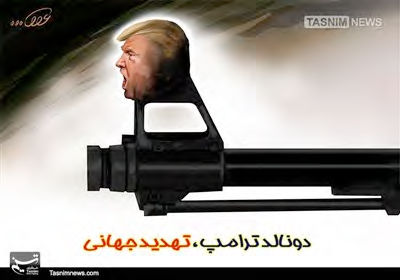




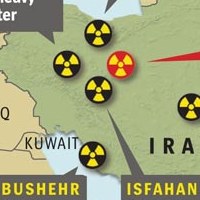
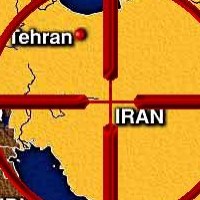




Latest Comments
Hello Mike, Thank you for your positive feedback to the article. I felt there wasn’t too much critical analysis of ...
Thanks for this considered and well constructed article. A follow up article on the manner in which the editorial contro...
THE CLUELESSNESS OF CLAIMING THAT OBAMA'S MIDDLE EAST POLICIES WERE A FAILURE CANNOT BE FURTHER FROM THE TRUTH, WHAT THE...
As long as Obama is the president of the usa do not trust the us government......
Thank you for an good read....